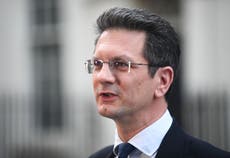‘This is levelling down’: Northern leaders react with fury and frustration to new tier system
Large swathes of north face toughest restrictions from next week – but no extra help for some businesses or road map out
Your support helps us to tell the story
From reproductive rights to climate change to Big Tech, The Independent is on the ground when the story is developing. Whether it's investigating the financials of Elon Musk's pro-Trump PAC or producing our latest documentary, 'The A Word', which shines a light on the American women fighting for reproductive rights, we know how important it is to parse out the facts from the messaging.
At such a critical moment in US history, we need reporters on the ground. Your donation allows us to keep sending journalists to speak to both sides of the story.
The Independent is trusted by Americans across the entire political spectrum. And unlike many other quality news outlets, we choose not to lock Americans out of our reporting and analysis with paywalls. We believe quality journalism should be available to everyone, paid for by those who can afford it.
Your support makes all the difference.Towns and cities in the north of England face “real hardship” after being placed in the strictest tier of the country’s new coronavirus alert system, Andy Burnham has warned.
The mayor of Greater Manchester led a chorus of regional leaders, MPs and business figures voicing frustration after the government announced vast swathes of the north would face the more severe restrictions but be given no additional financial support when the current national lockdown ends on 2 December.
Most of Yorkshire, the northeast, the Tees Valley and Lancashire will all join Manchester in tier 3 – meaning pubs , restaurants and entertainment venues will all have to stay shut. Other cities and regions further south including Bristol, Birmingham, Leicester and Kent also face the highest level of restrictions.
“The effect of these policy decisions will be to level down the economies of city regions,” Mr Burnham said. “It is unfair and the opposite of what the government has promised to do. Ministers must review this and provide more financial support.”
While he appeared to accept that Greater Manchester should be in the highest tier – the region’s hospitals remain worryingly close to capacity – he said more external help was needed if large chunks of the economy were to avoid failing.
“What we believe is completely wrong is the government’s decision to provide no additional business support to areas in tier 3 than those in tiers 1 and 2,” he said. “The new tier 3 will hit the hospitality sector extremely hard.
“While there are grants for businesses forced to close, there is no extra support for businesses which supply them like security, catering and cleaning.
“This will cause real hardship for people whose jobs will be affected and risk the loss of many businesses.”
Calls for greater economic help and a clear roadmap out of the strictest restrictions began across a wide geographic and political spectrum within minutes of Matt Hancock announcing the new tier divisions in the House of Commons on Thursday afternoon.
“This will have a brutal impact on many businesses in particular in the hospitality industry,” said Henri Murison, director of the Northern Powerhouse Partnership.
“Metro mayors and council leaders must have a say on whether these draconian measures continue after a few weeks. It is vital proper financial support is given to the worst-affected areas – many of which have been under restrictions since August and are in need of targeted support,” he added.
One of those metro mayors, Dan Jarvis, the Labour leader of the Sheffield City Region, added: “We must not stay [in tier three] a moment longer than we have to. We need better test and trace; better, fairer support for our people and businesses; and above all a credible road map out.”
Some Conservative MPs were equally unhappy. William Wragg, the Tory member for Hazel Grove in Greater Manchester, said infection rates in his own constituency were falling sharply and it should not have been lumped in with the wider region.
“We should be considered for tiering on a local authority basis,” he said. “As we have not been, I cannot support these proposals.”
The three Labour MPs for Leicester, which spent months under a local lockdown earlier this year, said ministers “must now spell out how we can get out of tier 3” to “give people hope their sacrifices will make a difference”.
“Local businesses need proper support, especially our pubs, cafes, bars and restaurants who will be devastated by the news they are in tier 3 in this crucial period in the run-up to Christmas," added Claudia Webbe, Jon Ashworth and Liz Kendall in a joint statement.
But there was some satisfaction too, notably in Liverpool, which was in tier 3 before the national lockdown but will now be placed in tier 2 following the city’s mass testing pilot, which appears to have helped drive virus rates down across Merseyside.
“If someone had told me six weeks ago Liverpool would be a tier 2 city by the start of December, I’d have seen that as a great result, and it is down to the fantastic support we have received from our residents,” said city mayor Joe Anderson.
“Back then, Covid-19 was spiralling out of control and our city’s hospitals were close to breaking point. We needed to get a grip – and quickly. That’s why we embraced tier 3 restrictions and worked fast to deliver the testing pilot, bringing in the army to help us deliver an efficient service.
“Thanks to that twin-track approach, today those trends are in full reverse. We have the virus where we want it – limited, contained and falling.”



Join our commenting forum
Join thought-provoking conversations, follow other Independent readers and see their replies
Comments